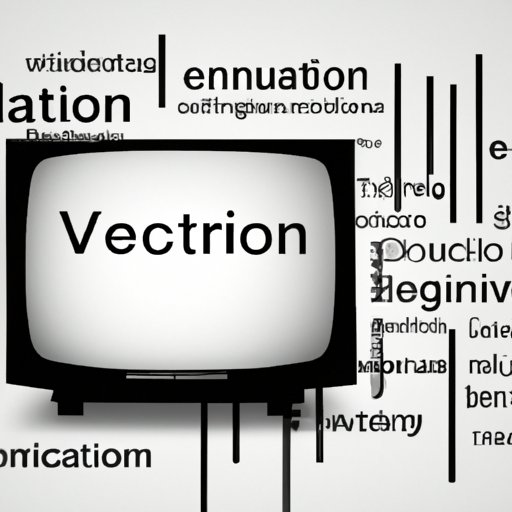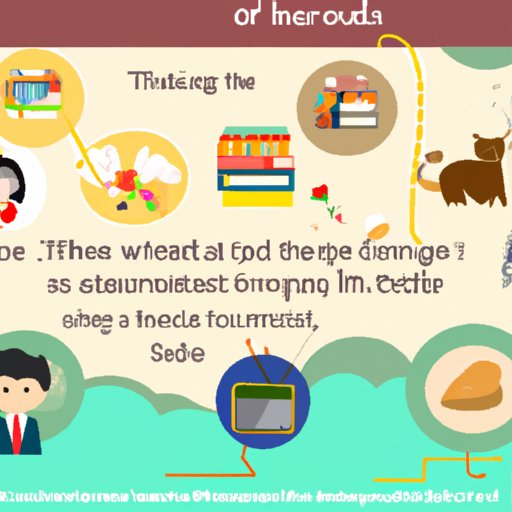Introduction
The concept of “literature” is complex and subjective, with many different interpretations and definitions. Generally, however, literature is defined as creative works that are designed to be read or performed, such as novels, short stories, plays, and poems. But what about television? Can television be considered literature and taught in English classes? This article will explore this question by examining the elements of television as literature, exploring the themes and ideas expressed through it, comparing and contrasting it to other forms of literary art, and evaluating the pedagogical benefits of teaching television as literature in English classes.

Examining the Elements of Television as Literature
When considering television as literature, one of the first elements to consider is the narrative. TV shows often have intricate storylines that span multiple episodes, with characters and plot points that build over time. While some shows may have a more episodic structure, with each episode providing a self-contained story, there are still elements of narrative that are present. For example, even in an episodic show, there may be ongoing storylines and character arcs that are developed over time.
Another element of television as literature is character development. Just like in books and plays, TV shows feature characters with complex personalities and motivations. These characters go through arcs and changes throughout the course of the show, and their relationships with other characters also evolve over time.
Finally, language and imagery are important elements of television as literature. Television shows feature dialogue and descriptions that can be just as vivid and evocative as any novel or poem. In addition, the visuals of a TV show can be just as powerful as any painting or sculpture, conveying moods and emotions in a way that words alone cannot.

Exploring the Themes and Ideas Expressed Through Television
In addition to the elements of television as literature, there are also themes and ideas that can be explored through it. TV shows often tackle difficult topics and social issues, from racism to mental health to gender inequity. They can also provide insight into different cultures and perspectives, allowing viewers to gain a deeper understanding of people who are different from them. And finally, TV shows often explore morality, presenting ethical dilemmas and allowing viewers to grapple with difficult questions about right and wrong.
Comparing and Contrasting TV to Other Forms of Literary Art
When considering television as literature, it is also important to compare and contrast it to other forms of literary art. Novels, for example, often feature detailed worldbuilding and intricate plots, while TV shows may focus more on character development and visual storytelling. Poetry, meanwhile, relies heavily on imagery and symbolism, while TV shows may focus more on dialogue and action. And finally, short stories often explore a single theme or idea in a concise way, while TV shows may take a longer approach, developing and exploring multiple themes over the course of multiple episodes.

Evaluating the Pedagogical Benefits of Teaching Television as Literature in English Classes
Teaching television as literature in English classes can also have numerous pedagogical benefits. First, it can help improve students’ critical thinking skills by forcing them to engage with the text in a more analytical way. Students must think beyond surface-level plot points and look at how the show’s themes and messages are conveyed through its characters, dialogue, and visuals.
Second, teaching television as literature can enhance student engagement with texts. Many students are already familiar with popular TV shows, which can make it easier for them to connect with the material and become more invested in it.
Finally, teaching television as literature can help develop students’ reading comprehension skills. By looking at the show’s narrative structure, characters, and themes, students can gain a better understanding of how to interpret and analyze texts.
Conclusion
In conclusion, television can be considered literature and taught in English classes. It features elements of literature, such as narrative, character development, and language and imagery. It also explores themes and ideas that can be just as meaningful and thought-provoking as any novel or poem. Finally, teaching television as literature can have numerous pedagogical benefits, such as improving critical thinking skills, enhancing engagement with texts, and developing reading comprehension.
(Note: Is this article not meeting your expectations? Do you have knowledge or insights to share? Unlock new opportunities and expand your reach by joining our authors team. Click Registration to join us and share your expertise with our readers.)
